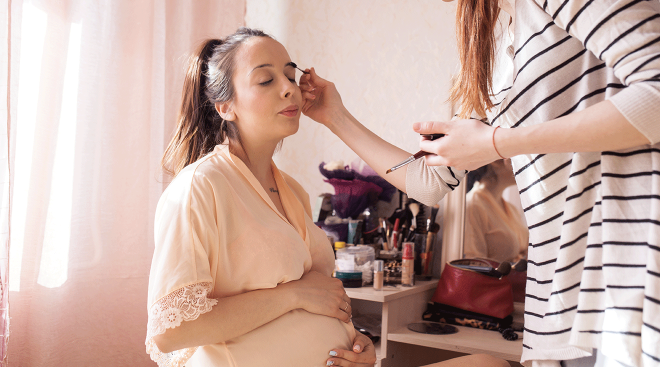- Good news: You should hopefully start feeling more like yourself soon, as you enter your second trimester. The initial pregnancy exhaustion may fade and the nausea might too! The honeymoon phase of pregnancy is approaching, meaning you might get a burst of energy for a few weeks.
- You might have a 13-week ultrasound or possible non-invasive prenatal testing (NIPT), which looks for chromosomal abnormalities. Baby’s sex might be detectable at this point too—but no guarantees.
The end of week 13 is the end of the first trimester! We’re not just talking about getting through those work meetings without falling asleep (or puking), we’re talking about how you’re now 1/3rd of the way through your pregnancy! At 13 weeks pregnant, you’ve grown a fetus that has vocal cords, teeth and even fingerprints (wow!), and you’ve probably kept this incredible news (mostly) secret while wishing you could shout it from the rooftops—or, at the very least, use it as an excuse for getting to work late.
That little cutie of yours is growing fast as you approach the second trimester. During week 13, baby is making urine that’s released into the amniotic fluid. And, FYI, this new development doesn’t stop baby from swallowing amniotic fluid—but don’t worry—it’s a totally safe and normal part of development. Speaking of swallowing, your little one might even be sucking their thumb already!
Wondering if your little one will be a chatterbox or have the singing voice to become the next Taylor Swift? There’s no telling yet, but their vocal cords do begin to develop at this point. Of course, these vocal cords won’t be put to the test until the day baby is born when they let out their first big cry.
How big is baby at 13 weeks?
At 13 weeks, baby is as big as a lemon. Your 13-week fetus is about 2.9 inches long and weighs about .81 ounces, and proportion-wise, their head is now about 1/3 the size of the body instead of 1/2.
13 weeks pregnant is how many months?
At 13 weeks pregnant, you're three months pregnant, although doctors track pregnancy by week, not month. This is the last week of the first trimester. (We can’t say it enough because it’s so great to be here!)
13 week ultrasound
A 13-week ultrasound could detect baby’s sex, but since it can be pretty tough to make out little boy or girl parts, your doctor will probably wait until the mid-pregnancy ultrasound (around 18 to 22 weeks), when it will be much more obvious, to look and see whether you’re having a girl or a boy.
If you’ve chosen to have prenatal cell-free DNA testing, also known as non-invasive prenatal testing (NIPT), to screen for chromosomal abnormalities, you’ll be able to find out the sex when you get your results. Hey, at 13 weeks, you may already know! Oh boy! (Or girl!)
You might notice that around 13 weeks pregnant, your symptoms change a bit. You might actually be able to get through the day without nausea (if not now, soon) or feeling the need to nap. But you may be experiencing a few of these 13 weeks pregnant symptoms too:
Visible veins
You can see all those blue streaks and spider veins under your skin because you have increased blood flow.
Increase in energy
The second trimester is known as the least symptomatic and the most energetic. As you start to feel more like yourself and get that energy surge, you’re going to want to knock a bunch of to-dos off your list. Also, if you’ve found yourself too sick and tired to exercise lately, now’s the time to get back to a fitness routine. Exercise will only benefit you and baby and can even make labor easier. Worth it!
Increased sex drive
If you’re one of those lucky pregnant women who feels up for a roll in the hay at 13 weeks, enjoy! You may notice a bit of post-coital spotting during pregnancy at 13 weeks. A little spotting is normal simply because your cervix is more sensitive. But heavy bleeding (like a period) isn’t, so call your doctor if it’s more like a flow. Otherwise, you and your partner can use your increased sex drive to enjoy some together time before baby arrives!
Sorry, twin moms-to-be. If you’re 13 weeks pregnant with twins, you might still be experiencing some morning sickness and fatigue. That’s because twin moms can have more of the pregnancy hormone hCG in their systems. If your nausea and vomiting is super severe, definitely bring it up to your OB. If you’re able to hold down food and liquids but you’re still feeling ill, just wait it out a little longer.
What should I expect at 13 weeks pregnant?
At 13 weeks pregnant, you’re turning the corner and may even feel like a new woman after a first trimester of morning sickness, fatigue and other issues. You may experience 13 weeks pregnant symptoms, as well as some indigestion, achiness and tiredness that’s typical in the first trimester. Expect to feel a lot more at ease in the second trimester!
Your uterus is now big enough that it’s growing up and out of your pelvis. That means you’re starting to actually look pregnant. Finally, right? Expect to look more and more pregnant from here on out, because carrying a 13-week fetus calls for a weight gain increase. OBs recommend you gain weight in the healthiest way possible—that means slowly and steadily throughout your pregnancy. Here are the weight gain guidelines outlined by the American College of Obstetricians and Gynecologists (ACOG):
If you’re underweight (BMI under 18.5):
- Your recommended total pregnancy weight gain is 28 to 40 pounds.
- In the second and third trimesters, aim to gain about a pound (1 to 1.3 pounds to be exact) per week.
If you’re normal weight (BMI of 18.5 to 24.9):
- Your recommended total pregnancy weight gain is 25 to 35 pounds.
- In the second and third trimesters, aim to gain about a pound or a little less (0.8 to 1 pound to be exact) per week.
If you’re overweight (BMI of 25 to 29.9):
- Your recommended total pregnancy weight gain is 15 to 25 pounds.
- In the second and third trimesters, aim to gain a little over a half pound (0.5 to 0.7 pounds to be exact) per week.
If you’re obese (BMI of 30 and above):
- Your recommended total pregnancy weight gain is 11 to 20 pounds.
- In the second and third trimesters, aim to gain about a half pound (0.4 to 0.6 pounds to be exact) per week.
If you’re 13 weeks pregnant with twins:
- Your recommended total pregnancy weight gain is 37 to 54 pounds.
- In the first half of your pregnancy, aim to gain about a pound per week. In the second half, aim to gain a little over a pound per week.
Of course, you don’t want to stress yourself out about these numbers. What’s important is that you’re eating a healthy diet full of a variety of different foods, eating about 300 extra (nutritious) calories per day more than you did pre-pregnancy and getting plenty of exercise.
How does your belly feel at 13 weeks pregnant?
You’re probably feeling great in terms of nausea and morning sickness! However, to make room for your fast-growing 13-week fetus, your uterus is moving upward and outward. This expansion can cause stretch marks and itchy belly skin. Don’t forget to moisturize and eat well to keep skin soft and supple!
Can you feel the baby at 13 weeks?
Possibly! It’s different for everyone, but some women (particularly those who have been pregnant before) may start to feel those telltale movements when baby’s at 13 weeks. If you haven’t felt the first flutters yet, don’t worry—it can take up to 25 weeks along to feel what’s called “the quickening.”
It's debatable how much one's calorie needs actually increase during pregnancy, because the data shows that it varies widely between women (though usually in the ballpark of 300 to 500 calories extra). One researcher suggests that the adage of ‘eating for two’ be replaced with ‘eating for 1.1’ to better reflect the moderate increase in calories per day. Focus on nutrient-dense foods, so every bite is as packed with nutrition as possible.
Know the signs of a UTI
Left untreated, a urinary tract infection can potentially travel to the kidneys and pose a health risk for Mom and baby. If you need to use the bathroom more often than usual, feel burning during urination or it looks or smells unusual, visit your doctor, who can test for bacteria and prescribe antibiotics.
Strengthen your pelvic floor
When you’re carrying a baby at 13 weeks, your body needs all the support it can get. Your pelvic floor can weaken from pregnancy and labor, but you can do Kegel exercises to strengthen the area. They don't take a lot of time or effort, and a regular routine during pregnancy can pay off with less urinary leakage after you give birth and enhanced sexual sensations. Sounds good!
Find some together time
You and your partner may be hot and heavy between the sheets right now, but have some fun outside the bedroom too, so you can spend quality time with each other before baby makes three.
Eat a good breakfast
No more morning sickness? Breakfast is served! It’s the perfect time to get calcium, protein and the powerful nutrients that come from produce and whole grains. A healthy morning meal can also help you set the tone for nutritious eating for the rest of the day.
Frequently Asked Questions
How long is the second trimester?
At week 13, you’re not quite out of the first trimester yet, but you’re only days away from that next milestone. The second trimester lasts from week 14 to week 27 (or, more precisely, to 26 weeks and 6 days), which comes out to 13 weeks total. The second trimester marks the middle of your pregnancy and is often when pregnant people feel their best in terms of symptoms.
How should I manage any lingering morning sickness at 13 weeks?
In many cases, morning sickness will subside by week 13, but for some pregnant people, this unpleasant symptom can last up to week 16 (or later). If you’re still feeling queasy at this point in pregnancy, treat nausea at home as you have up to this point by eating small snacks throughout the day, sticking to foods that are easy on your tummy (think bland), getting plenty of protein, and staying hydrated. If your symptoms become severe, get in touch with your ob-gyn to rule out any illness or hyperemesis gravidarum. You can also discuss adding ginger and B6 into your diet, or medications, if needed.
How can I prevent varicose veins during pregnancy?
Varicose veins are swollen and twisted veins in the body, and thanks to the increased blood flow that happens during pregnancy, you’re at a higher risk of developing them. To help prevent varicose veins, you should avoid wearing tight, constricting clothing, prop your feet up when sitting and avoid standing still or sitting for long periods of time. Keep in mind, however, that varicose veins are often hereditary, so if they run in your family, there’s only so much that can be done to avoid them.
When can I start prenatal yoga?
Prenatal yoga is an excellent form of physical activity during pregnancy. Typically, it’s safe to do prenatal yoga at any point, but every person and pregnancy is different, so it’s important to talk to your provider first to make sure you have the go-ahead from them before you begin practicing. It’s also helpful to talk to your yoga instructor ahead of class so they can help you with any adjustments you may need to feel comfortable.
Is it normal to get new moles during pregnancy?
In addition to a growing belly, thanks to hormones you’ll also experience changes in your skin throughout pregnancy. You may notice new dark marks, particularly on your face, called melasma (the mask of pregnancy) that can get worse with exposure to sunlight. Your existing moles may also change color or shape during pregnancy. This is often normal, but it's best to address with your ob-gyn or a dermatologist.
I would salivate at the thought of Swedish fish or sour candies. The funny part is, outside of pregnancy, I never liked candy. And I had to have a fast-food chain fried filet of fish sandwich at least once a week. In retrospect, I'm horrified. But at the time, amidst nausea and aversions, these foods were life giving.
Please note: The Bump and the materials and information it contains are not intended to, and do not constitute, medical or other health advice or diagnosis and should not be used as such. You should always consult with a qualified physician or health professional about your specific circumstances.
Ngina K. Connors, MD, MBA, a maternal-fetal medicine specialist and ob-gyn at Atrium Health Women’s Care Maternal Fetal Medicine in North Carolina. Connors earned her medical degree at the University of Pennsylvania.
American College of Obstetricians and Gynecologists, Weight Gain During Pregnancy, January 2013
American Pregnancy Association, 13 Weeks Pregnant
American Pregnancy Association, First Fetal Movement: Quickening
American Pregnancy Association, Kegel Exercises
American Pregnancy Association, Multiples Pregnancy: Twins, Triplets and More
American Pregnancy Association, Pregnancy Nutrtition
American Pregnancy Association, Uterus Size During Pregnancy
Cedars Sinai, Hemorrhoids and Varicose Veins in Pregnancy
Charlotte Lozier Institute, Week 13
Cleveland Clinic, First Trimester, August 2022
Cleveland Clinic, Second Trimester, November 2021
Cleveland Clinic, Morning Sickness, April 2023
Cleveland Clinic, NIPT Test, October 2022
Johns Hopkins Medicine, The Second Trimester
Madison Women’s Health, Ultrasounds During Pregnancy: What You Need to Know, March 2021
March of Dimes, Bleeding and Spotting From the Vagina During Pregnancy, April 2020
March of Dimes, Common Discomforts of Pregnancy, March 2022
March of Dimes, Exercise During Pregnancy, September 2020
March of Dimes, Morning Sickness, September 2022
Mayo Clinic, Fetal Development: The 1st Trimester, June 2022
Mayo Clinic, Fetal Development: The 2nd Trimester, June 2022
Mount Sinai, Morning Sickness
Planned Parenthood, What Happens in the Fourth Month of Pregnancy
University of Texas, MD Anderson Cancer Center, Pregnancy-related skin changes or skin cancer? How to tell the difference, February 2023
Learn how we ensure the accuracy of our content through our editorial and medical review process.
Navigate forward to interact with the calendar and select a date. Press the question mark key to get the keyboard shortcuts for changing dates.















































